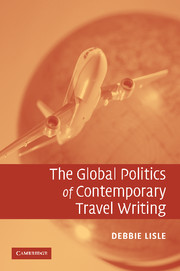Book contents
- Frontmatter
- Contents
- List of illustrations
- Preface
- ‘Travelogue’
- 1 Introduction: the global imaginary of contemporary travel writing
- 2 Between fact and fiction: the generic boundaries of travel writing
- 3 The cosmopolitan gaze: rearticulations of modern subjectivity
- 4 Civilising territory: geographies of safety and danger
- 5 Looking back: utopia, nostalgia and the myth of historical progress
- 6 Engaging the political: contemporary travel writing and the ethics of difference
- Bibliography
- Index
4 - Civilising territory: geographies of safety and danger
Published online by Cambridge University Press: 22 September 2009
- Frontmatter
- Contents
- List of illustrations
- Preface
- ‘Travelogue’
- 1 Introduction: the global imaginary of contemporary travel writing
- 2 Between fact and fiction: the generic boundaries of travel writing
- 3 The cosmopolitan gaze: rearticulations of modern subjectivity
- 4 Civilising territory: geographies of safety and danger
- 5 Looking back: utopia, nostalgia and the myth of historical progress
- 6 Engaging the political: contemporary travel writing and the ethics of difference
- Bibliography
- Index
Summary
I'm not that comfortable about writing about the third world.
I find it hard to make jokes when people are sleeping under bridges and don't have enough to eat.
Bill BrysonAfter publishing successful travelogues about America, Europe, the UK and Australia, Bill Bryson was approached by the charity CARE International to write a book about some of their development projects in Kenya. The result was a carefully orchestrated eight-day trip and a 56-page travelogue – African Diary – which was published just before Christmas 2002. The whole point of the endeavour was that all profits from Bryson's African Diary went directly to CARE International. While the book was an entirely worthy effort to eradicate poverty and underdevelopment, its worthiness reveals something important about the limitations of Bryson's cosmopolitan vision. African Diary tries to squeeze Kenya into Bryson's well-established comedic formula of ‘ordinary guy abroad’: he continues to be self-deprecating (he is afraid of flying, afraid of snakes, afraid of catching a disease); he embellishes his romantic notions of Africa (gleaned largely from ‘Jungle Jim’ movies of the 1950s); he gushes about the Rift Valley (‘startlingly sumptuous in its beauty’); and he carefully contrasts himself (scared, timid, innocent, naïve) with the brave and committed workers in CARE International. Initially, Bryson's reactions to Kenya are a familiar blend of innocence and incredulity: for example, he is dumbfounded by the statistics of poverty in Nairobi's largest slum: ‘Really? … That's amazing! … Truly?’
- Type
- Chapter
- Information
- The Global Politics of Contemporary Travel Writing , pp. 134 - 202Publisher: Cambridge University PressPrint publication year: 2006



